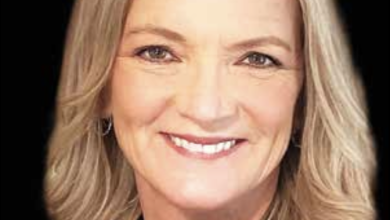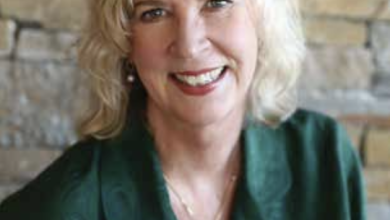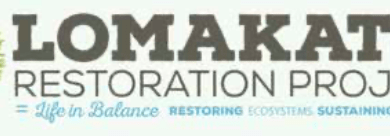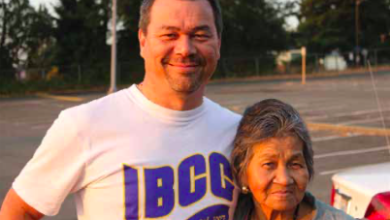The People Who Make Ashland Special – Getting to know Greg White, a Native Ashlander Serving the Almeda Fire Survivors
It’s interesting to learn about Ashland from people who have lived here most of their lives, or at least 30 or 40 years. It’s seemingly rare to encounter native Ashlanders like that. Greg White is a 39-year contributor to the community here, beginning as a muscle-car-driving teenager and high school football star in the 80s, to a father of four and president of Reinholdt and O’Harra Insurance today.
The ripple effects of the Almeda Wildfire tragedy have touched nearly everyone locally and many beyond. A virtual lifeline for the thousands of survivors has been the insurance industry, and Greg has been a frontline hero to hundreds of his clients and friends, helping to catalyze their recovery.
You’ve lived here most of your life Greg, right? Is there a particular date or period of time that stands out in your mind?
“It’s obviously a hot topic and something we don’t necessarily want to be dealing with now, but certainly we are. What is the date I will never forget in Ashland? September 8, 2020. The morning the Almeda Fire started, and immediately knowing how difficult this was going to be for so many families.”
Really? Wow, so it was right as you heard about the fire, at 11 am or so; that you’re immediately imagining the claims you’ll soon be dealing with?
“Oh yes, thinking of who we know, and who we insure, right away. And then as [the fire] got bigger and bigger, and moving into Talent and Phoenix; I was texting one of my clients and friends, who was literally on the roof of his house with a garden hose. I said, ‘it’s time for you to leave. You need to get out of there.’ Because his safety was more important, him and his family. He lost his house.”
The sobering inflection of Greg’s voice as he recounted the story was striking to hear. And it took me right back to the feelings of sudden shock and disbelief that we all experienced that day. It was certainly an unforgettable day for the thousands who lost literally everything, a life-altering tragedy that has been nearly unimaginable for the rest of us.
“We just have story after story, of people just barely getting out, and getting out with nothing. Nothing. Just the clothes on their back, and maybe just one of their cars. Just incredible devastation to these families, and the loss that they’re dealing with.”
“It’s been a tough year for that. I mean I think I’ve got a pretty good relationship with my clients; they know me and my kids and my family and I know theirs. And it definitely makes it personal. There were a lot of tears shed, a lot of emotional phone conversations and meetings, and they’re still going on. We’re still dealing with getting people back and making them whole again with their property.”
“And it’s not even the houses that will get rebuilt, it’s the things that people lose and can’t replace. That’s the saddest part of course. One of my clients, she likes to do stamping; cards and things, a whole room full; all gone. Another client had a collector car, a family heirloom, that’s the kind of stuff that insurance money can’t replace.”
“Luckily for us, all our [insurance carriers] have been really, really generous. Right away they had teams flying in and cutting checks. Some people weren’t aware of the coverage they had and all the things they had coming to them. We’re really proud to say that one of our clients, in Talent, was the first one to be rebuilding. Their new foundation went in about two weeks ago, and the framing is going up now.”
“I think it’s a major step of the grieving process to be at the place where people know that it’s going to be ok. They’ve got a place to go back to and are able to go out and replace the contents. And that life will get back to normal, somewhat back to normal.”
Do you see people maybe re-evaluating what’s really important? All the stuff?
“Oh yeah, of course- we’ve got clients reevaluating if this is even the PLACE they want to be, literally starting over somewhere else. So do they want to be in Texas? In California? In Florida? And that’s an option for them. We actually have quite a few clients that are taking the money and running, and selling their lot at some point.”
Oh really? That’s interesting; how many people would you estimate are leaving the area entirely?
“I would say in the 20-30% range; people who are just cashing out. But on the personal property side, right away people have to go out and buy clothing, bathroom supplies, and food. You don’t have to buy the furniture until you’re actually moving back into your house. People are thinking to be a little more minimalistic; ‘maybe I don’t need as much as I had before’ [they’re thinking].”
“People who were in manufactured homes; that’s the toughest because those really aren’t the kinds of properties that are available here right now. So maybe they’re buying out of the area now; Grants Pass, Roseburg. They still want to be in Southern Oregon, but there just isn’t any inventory to purchase around here.”
“Even people who didn’t lose everything still have claims too; smoke damage, or all the food they lost in their freezer when the power was off. I just really appreciate the Rogue Valley and all the organizations who’ve been stepping up to help all these people, their fellow human beings. Witnessing all that is incredible.”
Interesting things to know about Greg: He’s a Buffalo Bills fan, a coach and mentor to 100’s of Ashland athletes, and a former manager of Radio Shack (for those who can even remember what Radio Shack was!) His favorite rock band is Journey, hands down, and in 1989; Greg and his bride Llona had the privilege of holding their wedding at the Japanese Gardens in Lithia Park, with the reception in Pioneer Hall.
You grew up in Ashland; certainly, you’ve seen it change?
“The reason I remember the day I moved to Ashland is because it was right around my 14th birthday, October 1981. My dad got a job with the Ashland Fire Department, and we relocated here from the Salinas-Monterey area in California. That was right in the middle of eighth grade, Ashland Junior High School, which was actually 7th, 8th and 9th grade at that time. I’ve always been an outgoing person, and I joined the football team and made some friends, people I’m still in contact with now, all these years later.”
“Growing up in the 80s here was a lot of fun, I was highly involved with sports. I loved playing football on the Grizzly’s field on Friday nights, and our basketball team was undefeated, we took fourth in State my senior year, and I ran track too, so I was a letterman all three years in those three sports. I wanted to play baseball too, but my quarterback coach told me if I wanted to play quarterback, I needed to run hurdles. So I did track instead!”
What was it like being a teenager in Ashland?
“When I moved here in the 80s, it was pretty much still a mill town. There were three or four mills running at the time, lumber mills. And Lithia Park has always been beautiful, and tourism, the [Shakespeare] Festival. One of my best friends growing up was Will Patton, and his father was the head of the Festival, and his mom acted in a lot of the plays, Shirley Patton. We would be hanging out at night, and we might want to see a play. So Will would call down there and say ‘this is Will Patton’, and then we’d get to go see a play that night!”
“And having my dad on the fire department; I had a ’68 Chevelle that was pretty beefed-up, and the cops would pull me over and it would get back to my dad and he’d threaten to take the engine out of my car. But he never did, and luckily I never got any tickets!”
“The downtown was pretty depressed at that time, a lot of empty shops, but still a really cool place to grow up. When you go to school here, kids are saying it’s so boring and want to get out to the big city. But now they’re having kids, and I’m seeing a lot of them coming back, because they’re realizing that hey, this is a really great place to live and raise a family and be part of a real community.”
Do you happen to have any ghost stories living in Ashland?
“Well, yes actually; we bought an old farmhouse on East Main Street, built in the 30s, and some of my old-timer Ashland friends told us it was thought to be haunted. A woman had been killed there, in the 60s sometime, it’s still unsolved. Her name was Marion Hamilton. Supposedly there was a knock on the door, she answered the door, and nine shots were fired.”
“So just last summer, we were camping with our boys, and Ethan, our second-oldest son, told us a story that happened when he was about 14 at the time. Gavin, who was about 2 or 3 at the time, he’s 15 now, was in one of the rooms upstairs. And Ethan hears Gavin having a conversation with somebody, and he walks into the room asking who Gavin is talking to. And Gavin points and says, ‘to her’, but there was nobody there. There were some other stories of hearing footsteps on the stairs, and doors opening and closing; things like that. One of their friends spent one night with us but refused to come back because something had terrified him so much.”
What advice do you have for the young people in our community, Greg?
“Well, I actually have young people in the community; I have two kids that have gone through the school system here that are just out of college now, Danial and Ethan. And I have a freshman son, Gavin, and a seventh-grade daughter, Ella. And you know I coach a lot, so I think my advice has always been to families and parents is that kids need to stay busy. They need something to do, somewhere to go, and somebody to be accountable to. And I think having that, whether it’s sports, or drama, or music; or to be on another kind of team, it doesn’t matter. I just think kids need to be around other kids first of all, and that’s why this whole online learning thing now is just awful. I think kids just need to be keeping busy with something, and doing it with other kids.”
Jordan Pease is a 19-year resident of Ashland and Founder/Director of Rogue Valley Metaphysical Library and Media Exchange. www.RVML.org




